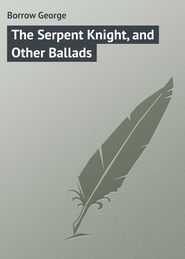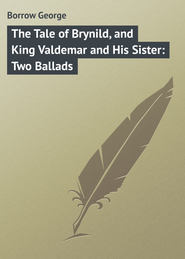По всем вопросам обращайтесь на: info@litportal.ru
(©) 2003-2024.
✖
Lavengro: The Scholar, The Gypsy, The Priest
Настройки чтения
Размер шрифта
Высота строк
Поля
‘But you have other things to do?’
‘Sorra anything else has Murtagh to do that he cares about; and that makes me dread so going home at nights.’
‘I should like to know all about you; where do you live, joy?’
‘Faith, then, ye shall know all about me, and where I live. It is at a place called the Wilderness that I live, and they call it so, because it is a fearful wild place, without any house near it but my father’s own; and that’s where I live when at home.’
‘And your father is a farmer, I suppose?’
‘You may say that; and it is a farmer I should have been, like my brother Denis, had not my uncle Phelim, the thief, tould my father to send me to school, to learn Greek letters, that I might be made a saggart of, and sent to Paris and Salamanca.’
‘And you would rather be a farmer than a priest?’
‘You may say that! – for, were I a farmer, like the rest, I should have something to do, like the rest – something that I cared for – and I should come home tired at night, and fall asleep, as the rest do, before the fire; but when I comes home at night I am not tired, for I have been doing nothing all day that I care for; and then I sits down and stares about me, and at the fire, till I become frighted; and then I shouts to my brother Denis, or to the gossoons, “Get up, I say, and let’s be doing something; tell us the tale of Finn-ma-Coul, and how he lay down in the Shannon’s bed, and let the river flow down his jaws!” Arrah, Shorsha! I wish you would come and stay with us, and tell us some o’ your sweet stories of your own self and the snake ye carried about wid ye. Faith, Shorsha dear! that snake bates anything about Finn-ma-Coul or Brian Boroo, the thieves two, bad luck to them!’
‘And do they get up and tell you stories?’
‘Sometimes they does, but oftenmost they curses me, and bids me be quiet! But I can’t be quiet, either before the fire or abed; so I runs out of the house, and stares at the rocks, at the trees, and sometimes at the clouds, as they run a race across the bright moon; and, the more I stares, the more frighted I grows, till I screeches and holloas. And last night I went into the barn, and hid my face in the straw; and there, as I lay and shivered in the straw, I heard a voice above my head singing out “To whit, to whoo!” and then up I starts, and runs into the house, and falls over my brother Denis, as he lies at the fire. “What’s that for?” says he. “Get up, you thief!” says I, “and be helping me. I have been out into the barn, and an owl has crow’d at me!”’
‘And what has this to do with playing cards?’
‘Little enough, Shorsha dear! – If there were card-playing, I should not be frighted.’
‘And why do you not play at cards?’
‘Did I not tell you that the thief, my uncle Phelim, stole away the pack? If we had the pack, my brother Denis and the gossoons would be ready enough to get up from their sleep before the fire, and play cards with me for ha’pence, or eggs, or nothing at all; but the pack is gone – bad luck to the thief who took it!’
‘And why don’t you buy another?’
‘Is it of buying you are speaking? And where am I to get the money?’
‘Ah! that’s another thing!’
‘Faith it is, honey! – And now the Christmas holidays is coming, when I shall be at home by day as well as night, and then what am I to do? Since I have been a saggarting, I have been good for nothing at all – neither for work nor Greek – only to play cards! Faith, it’s going mad I will be!’
‘I say, Murtagh!’
‘Yes, Shorsha dear!’
‘I have a pack of cards.’
‘You don’t say so, Shorsha ma vourneen? – you don’t say that you have cards fifty-two?’
‘I do, though; and they are quite new – never been once used.’
‘And you’ll be lending them to me, I warrant?’
‘Don’t think it! – But I’ll sell them to you, joy, if you like.’
‘Hanam mon Dioul! am I not after telling you that I have no money at all!’
‘But you have as good as money, to me, at least; and I’ll take it in exchange.’
‘What’s that, Shorsha dear?’
‘Irish!’
‘Irish?’
‘Yes, you speak Irish; I heard you talking it the other day to the cripple. You shall teach me Irish.’
‘And is it a language-master you’d be making of me?’
‘To be sure! – what better can you do? – it would help you to pass your time at school. You can’t learn Greek, so you must teach Irish!’
Before Christmas, Murtagh was playing at cards with his brother Denis, and I could speak a considerable quantity of broken Irish.
CHAPTER ELEVEN
When Christmas was over, and the new year commenced, we broke up our quarters, and marched away to Templemore. This was a large military station, situated in a wild and thinly inhabited country. Extensive bogs were in the neighbourhood, connected with the huge bog of Allen, the Palus Mæotis of Ireland. Here and there was seen a ruined castle looming through the mists of winter; whilst, at the distance of seven miles, rose a singular mountain, exhibiting in its brow a chasm, or vacuum, just, for all the world, as if a piece had been bitten out; a feat which, according to the tradition of the country, had actually been performed by his Satanic majesty, who, after flying for some leagues with the morsel in his mouth, becoming weary, dropped it in the vicinity of Cashel, where it may now be seen in the shape of a bold bluff hill, crowned with the ruins of a stately edifice, probably built by some ancient Irish king.
We had been here only a few days, when my brother, who, as I have before observed, had become one of his Majesty’s officers, was sent on detachment to a village at about ten miles’ distance. He was not sixteen, and, though three years older than myself, scarcely my equal in stature, for I had become tall and large-limbed for my age; but there was a spirit in him which would not have disgraced a general; and, nothing daunted at the considerable responsibility which he was about to incur, he marched sturdily out of the barrack-yard at the head of his party, consisting of twenty light-infantry men, and a tall grenadier sergeant, selected expressly by my father, for the soldier-like qualities which he possessed, to accompany his son on this his first expedition. So out of the barrack-yard, with something of an air, marched my dear brother, his single drum and fife playing the inspiring old melody,
Marlbrouk is gone to the wars,
He’ll never return no more!
I soon missed my brother, for I was now alone, with no being, at all assimilating in age, with whom I could exchange a word. Of late years, from being almost constantly at school, I had cast aside, in a great degree, my unsocial habits and natural reserve, but in the desolate region in which we now were there was no school; and I felt doubly the loss of my brother, whom, moreover, I tenderly loved for his own sake. Books I had none, at least such ‘as I cared about’; and with respect to the old volume, the wonders of which had first beguiled me into common reading, I had so frequently pored over its pages, that I had almost got its contents by heart. I was therefore in danger of falling into the same predicament as Murtagh, becoming ‘frighted’ from having nothing to do! Nay, I had not even his resources; I cared not for cards, even if I possessed them and could find people disposed to play with them. However, I made the most of circumstances, and roamed about the desolate fields and bogs in the neighbourhood, sometimes entering the cabins of the peasantry, with a ‘God’s blessing upon you, good people!’ where I would take my seat on the ‘stranger’s stone’ at the corner of the hearth, and, looking them full in the face, would listen to the carles and carlines talking Irish.
Ah, that Irish! How frequently do circumstances, at first sight the most trivial and unimportant, exercise a mighty and permanent influence on our habits and pursuits! – how frequently is a stream turned aside from its natural course by some little rock or knoll, causing it to make an abrupt turn! On a wild road in Ireland I had heard Irish spoken for the first time; and I was seized with a desire to learn Irish, the acquisition of which, in my case, became the stepping-stone to other languages. I had previously learnt Latin, or rather Lilly; but neither Latin nor Lilly made me a philologist. I had frequently heard French and other languages, but had felt little desire to become acquainted with them; and what, it may be asked, was there connected with the Irish calculated to recommend it to my attention?
First of all, and principally, I believe, the strangeness and singularity of its tones; then there was something mysterious and uncommon associated with its use. It was not a school language, to acquire which was considered an imperative duty; no, no; nor was it a drawing-room language, drawled out, occasionally, in shreds and patches, by the ladies of generals and other great dignitaries, to the ineffable dismay of poor officers’ wives. Nothing of the kind; but a speech spoken in out-of-the-way desolate places, and in cut-throat kens, where thirty ruffians, at the sight of the king’s minions, would spring up with brandished sticks and an ‘ubbubboo like the blowing up of a powder-magazine.’ Such were the points connected with the Irish, which first awakened in my mind the desire of acquiring it; and by acquiring it I became, as I have already said, enamoured of languages. Having learnt one by choice I speedily, as the reader will perceive, learnt others, some of which were widely different from Irish.
Ah, that Irish! I am much indebted to it in more ways than one. But I am afraid I have followed the way of the world, which is very much wont to neglect original friends and benefactors. I frequently find myself, at present, turning up my nose at Irish when I hear it in the street; yet I have still a kind of regard for it, the fine old language:
A labhair Padruic n’insefail nan riogh.
One of the most peculiar features of this part of Ireland is the ruined castles, which are so thick and numerous that the face of the country appears studded with them, it being difficult to choose any situation from which one, at least, may not be descried. They are of various ages and styles of architecture, some of great antiquity, like the stately remains which crown the Crag of Cashel; others built by the early English conquerors; others, and probably the greater part, erections of the times of Elizabeth and Cromwell. The whole speaking monuments of the troubled and insecure state of the country, from the most remote periods to a comparatively modern time.
From the windows of the room where I slept I had a view of one of these old places – an indistinct one, it is true, the distance being too great to permit me to distinguish more than the general outline. I had an anxious desire to explore it. It stood to the south-east; in which direction, however, a black bog intervened, which had more than once baffled all my attempts to cross it. One morning, however, when the sun shone brightly upon the old building, it appeared so near, that I felt ashamed at not being able to accomplish a feat seemingly so easy; I determined, therefore, upon another trial. I reached the bog, and was about to venture upon its black surface, and to pick my way amongst its innumerable holes, yawning horribly, and half filled with water black as soot, when it suddenly occurred to me that there was a road to the south, by following which I might find a more convenient route to the object of my wishes. The event justified my expectations, for, after following the road for some three miles, seemingly in the direction of the Devil’s Mountain, I suddenly beheld the castle on my left.
I diverged from the road, and, crossing two or three fields, came to a small grassy plain, in the midst of which stood the castle. About a gun-shot to the south was a small village, which had, probably, in ancient days, sprung up beneath its protection. A kind of awe came over me as I approached the old building. The sun no longer shone upon it, and it looked so grim, so desolate and solitary; and here was I, in that wild country, alone with that grim building before me. The village was within sight, it is true; but it might be a village of the dead for what I knew; no sound issued from it, no smoke was rising from its roofs, neither man nor beast was visible, no life, no motion – it looked as desolate as the castle itself. Yet I was bent on the adventure, and moved on towards the castle across the green plain, occasionally casting a startled glance around me; and now I was close to it.
It was surrounded by a quadrangular wall, about ten feet in height, with a square tower at each corner. At first I could discover no entrance; walking round, however, to the northern side, I found a wide and lofty gateway with a tower above it, similar to those at the angles of the wall; on this side the ground sloped gently down towards the bog, which was here skirted by an abundant growth of copse-wood and a few evergreen oaks. I passed through the gateway, and found myself within a square enclosure of about two acres. On one side rose a round and lofty keep, or donjon, with a conical roof, part of which had fallen down, strewing the square with its ruins. Close to the keep, on the other side, stood the remains of an oblong house, built something in the modern style, with various window-holes; nothing remained but the bare walls and a few projecting stumps of beams, which seemed to have been half burnt. The interior of the walls was blackened, as if by fire; fire also appeared at one time to have raged out of the window-holes, for the outside about them was black, portentously so. ‘I wonder what has been going on here?’ I exclaimed.
There were echoes among the walls as I walked about the court. I entered the keep by a low and frowning doorway: the lower floor consisted of a large dungeon-like room, with a vaulted roof; on the left hand was a winding staircase in the thickness of the wall; it looked anything but inviting; yet I stole softly up, my heart beating. On the top of the first flight of stairs was an arched doorway, to the left was a dark passage, to the right, stairs leading still higher. I stepped under the arch and found myself in an apartment somewhat similar to the one below, but higher. There was an object at the farther end.
An old woman, at least eighty, was seated on a stone, cowering over a few sticks burning feebly on what had once been a right noble and cheerful hearth; her side-glance was towards the doorway as I entered, for she had heard my footsteps. I stood suddenly still, and her haggard glance rested on my face.











